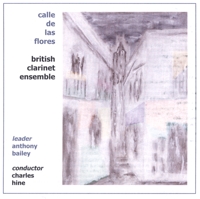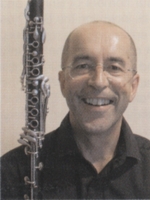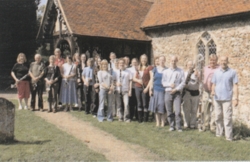Calle de las Flores
Featuring works by British Composers the BCE recorded this their third CD in Copford Parish Church, Copford, Essex in August 2008. The producers are Tim Redpath & Rachel Calaminus. The music on the CD is: The Sands of Time, ROB WIFFIN; Introduction and Rondo - GORDON JACOB; Nebula - EDWIN ROXBURGH; Three Southern Sketches - JAMES RAE; Wind in the Reeds - GORDON JACOB; Molly on the Shore - PERCY GRAINGER arr. Andrew Smith; Jiggery-pokery - SIMON SPEARE; Calle de las Flores GORDON LEWIN. Buy this album now CD: £12.00 + p&p |
| 1-2 | The Sands of Time | ROB WIFFIN | 9:49 |
| 3 | Introduction and Rondo | GORDON JACOB | 5:52 |
| 5-7 | Nebula | EDWIN ROXBURGH | 10:17 |
| 5-7 | Three Southern Sketches | JAMES RAE | 10:21 |
| 8-11 | Wind in the Reeds | GORDON JACOB | 10:37 |
| 12 | Molly on the Shore | PERCY GRAINGER arr. Andrew Smith |
3:53 |
| 13 | Jiggery-pokery | SIMON SPEARE | 5:40 |
| 14 | Calle de las Flores | GORDON LEWIN | 7:49 |
| TOTAL PLAYING TIME | 65:02 |
Sleeve Notes Rob Wiffin began his musical career as a trombonist, playing in the National Youth Orchestra of Great Britain before entering the Royal College of Music. On completion of his studies, he joined the Royal Air Force Music Services becoming principal trombone of the Central Band and then conducting the Band of the RAE Regiment, the RAE Western Band and the RAE Central Band. In 1998 he was promoted to Principal Director of Music, RAE. Away from the RAE he has built his reputation by conducting orchestras, wind ensembles and many of the country’s finest brass bands. On leaving the RAE he relocated to Spain where he spent much of his time composing and arranging music and, to his surprise, was in demand as a trombone player. While maintaining his Iberian links, he has resumed his activities in the UK as conductor, adjudicator and examiner in addition to composing, arranging and teaching. In June 2007 he was appointed Professor of Conducting at the Royal Military School of Music, Kneller Hall.
Gordon Jacob 1895-1984. After his initial schooling at Duiwich College, Gordon Jacob became a student at the Royal College of Music in London, where his tutors included Stanford, Parry and Howells. He taught briefly at Birkbeck and Morley Colleges, also in London, before returning to the Royal College as a lecturer in 1926 remaining there until his retirement in 1966.
Edwin Roxburgh began his musical life as a chorister at the Liverpool Anglican Cathedral, attended the Matthay School of Music in Liverpool, played in the National Youth Orchestra of Great Britain and won a double scholarship to the Royal College of Music. Further awards enabled him to study with Nadia Boulanger in Paris and with Luigi Dallapiccola in Florence. After he had completed his studies, Edwin was appointed principal oboist in the Sadlers Wells Opera. Subsequently, while a teacher at the Royal College of Music, he began a highly successful career as an oboist, establishing himself as a major interpreter of contemporary repertoire. He also established and conducted the 20th Century Ensemble of London. He has composed over 60 works for a wide range of performers and ensembles. In 2003 he was appointed Vaughan Williams Fellow in Composition at the RCM and awarded a Leverhulme Research Fellowship.
James Rae studied at the Gulidhall School ot Music and Drama trom 1975-79. Since leaving the Guildhall, he has pursued a highly successful and varied career in music. As a player, he has worked in many West End and Royal National Theatre productions and with some ot the country’s leading orchestras and ensembles. Projects have included the EMI album ‘Classic Ellington’ with Sir Simon Rattle and the C.B.S.O. Saxophone Quartet playing has featured strongly in his career and he is leader of the Phoenix Saxophone Quartet which have given many recitals and broadcasts. As a composer, he is one of Europe’s most published writers of educational wind music. As a teacher, he has held many posts in both the state and independent sector and has tutored and conducted on numerous courses. He is currently saxophone professor for the National Youth Orchestra of Great Britain.
Percy Grainger
Simon Speare was born and brought up in Cornwall. He studied composition with Simon Holt at City University, London. His music has been widely performed by professional and amateur performers and has been broadcast on national radio and television. He was Composer in Association with London Concert Choir and Composer in Residence at the Centre for Young Musicians, London. He is artistic director of the ensemble Big Noise, who released their debut CD in 2005, and he has devised and presented a contemporary music show on Resonance FM. He teaches composition at both The Purcell School and the Royal Holloway College. He has also been a lead composer on the award winning SPNM Sound Inventors education project.
Gordon Lewin 1921 -2008 Gordon Lewin, clarinettist, saxophonist and composer spent most of his career in the recording studios playing for films, radio and TV. He also composed and arranged music with over sixty published works for wind instruments of which many are for clarinet ensemble.
|
Credits Recorded in August 2008 at the Church of
St Michael and All Angels, Copford, Essex. Cover original canvas: Bill Vine |
| Instruments: | Clarinet Ensemble |
| Genre: | Contemporary British |
| Format: | Audio CD |
| Our Ref: | A0332 |
| MCPS: | BCE 103 |
| Label: | British Clarinet Ensemble |
| Year: | 2009 |
| Origin: | UK |
British Clarinet Ensemble Eb Clarinets: Bb Clarinets: Alto Clarinets: Bass Clarinets: Contrabass Clarinets:
The BCE acknowledges sponsorship from the Clarinet & Saxophone Society of Great Britain, Vandoren, Buffet, Selmer and the Colchester Institute Research Panel. Further Information about the BCE can be found at www.britishclarinetensemble.co.uk |
|
| Contact | John Mackenzie |
| admin@britishclarinetensemble.co.uk | |
| Web site | www.britishclarinetensemble.co.uk |

 Charles
Hine studied clarinet at the Royal Academy of Music
where he received numerous awards including the Geoffrey Hawkes
Prize for Clarinet, the Lady Holland Prize for Composition
and the Recital Diploma. During his studies he won the “Young
Musician” Award for South East England and has since
been honoured with an ARAM. Since the early 1970s Charles has
followed a career as a clarinettist, performing in principal
positions with some of Britain’s leading orchestras as
well as continuing to give solo recitals and concerto performances.
He has premiered many works for solo clarinet and is a founder
member of the Vega Wind Quintet. Charles is deeply involved
with the promotion of wind music and especially its educational
aspect, including being Chairman of the British Association
of Symphonic Bands and Wind Ensembles (BASBWE) Education Trust
and a former Chairman of the national association of BASBWE.
He is currently Curriculum Manger for Higher Education Music
and Head of Woodwind and Performance Studies at the Coichester
Institute, Centre for Music and Performing Arts. He is director
of the Essex Youth Symphonic Wind Orchestra and for many years
directed the Royal College of Music Junior Department Wind
Orchestra and Clarinet Choir. He has also been invited to be
a guest conductor by orchestras and bands in England and Scotland.
Much in demand as an adjudicator, he has chaired the assessment
panels for the National Concert Band Festival and the National
Festival of Music for Youth, as well as leading seminars and
giving clinics and master classes on all aspects of clarinet,
wind ensemble and band playing.
Charles
Hine studied clarinet at the Royal Academy of Music
where he received numerous awards including the Geoffrey Hawkes
Prize for Clarinet, the Lady Holland Prize for Composition
and the Recital Diploma. During his studies he won the “Young
Musician” Award for South East England and has since
been honoured with an ARAM. Since the early 1970s Charles has
followed a career as a clarinettist, performing in principal
positions with some of Britain’s leading orchestras as
well as continuing to give solo recitals and concerto performances.
He has premiered many works for solo clarinet and is a founder
member of the Vega Wind Quintet. Charles is deeply involved
with the promotion of wind music and especially its educational
aspect, including being Chairman of the British Association
of Symphonic Bands and Wind Ensembles (BASBWE) Education Trust
and a former Chairman of the national association of BASBWE.
He is currently Curriculum Manger for Higher Education Music
and Head of Woodwind and Performance Studies at the Coichester
Institute, Centre for Music and Performing Arts. He is director
of the Essex Youth Symphonic Wind Orchestra and for many years
directed the Royal College of Music Junior Department Wind
Orchestra and Clarinet Choir. He has also been invited to be
a guest conductor by orchestras and bands in England and Scotland.
Much in demand as an adjudicator, he has chaired the assessment
panels for the National Concert Band Festival and the National
Festival of Music for Youth, as well as leading seminars and
giving clinics and master classes on all aspects of clarinet,
wind ensemble and band playing. The British Clarinet Ensemble was
formed in 1995 under the auspices of the Clarinet and Saxophone
Society of Great Britain. Its members are drawn from all four
corners of Britain and include professional and amateur players,
teachers and students. Since its inception the BCE has championed
British composers, regularly commissioning new works and enhancing
the repertoire. In the UK, performances have been given at
conferences of the Clarinet and Saxophone Society of Great
Britain and the British Association of Symphonic Bands and
Wind Ensembles. Since their first tour to Finland in July 1995
the BCE has performed in Belgium, Japan and the USA at the
International Clarinet Association’s “Clarinetfests’,
in Hungary and Poland for the European Clarinet and Saxophone
Society and in the Netherlands for the Netherlands Single Reed
Society.
The British Clarinet Ensemble was
formed in 1995 under the auspices of the Clarinet and Saxophone
Society of Great Britain. Its members are drawn from all four
corners of Britain and include professional and amateur players,
teachers and students. Since its inception the BCE has championed
British composers, regularly commissioning new works and enhancing
the repertoire. In the UK, performances have been given at
conferences of the Clarinet and Saxophone Society of Great
Britain and the British Association of Symphonic Bands and
Wind Ensembles. Since their first tour to Finland in July 1995
the BCE has performed in Belgium, Japan and the USA at the
International Clarinet Association’s “Clarinetfests’,
in Hungary and Poland for the European Clarinet and Saxophone
Society and in the Netherlands for the Netherlands Single Reed
Society.

